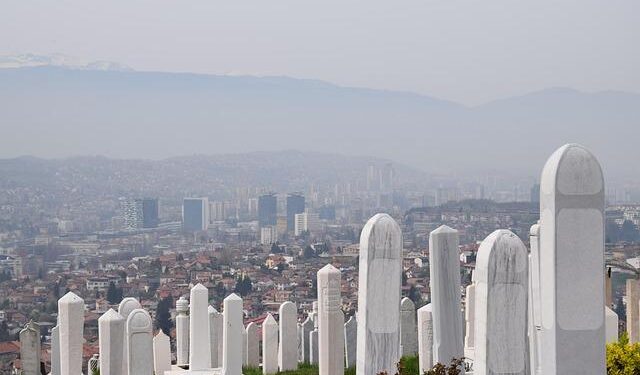Tensions are once again mounting in the Balkans as Bosnia and Herzegovina emerges at the center of European concern. Long considered a fragile post-conflict state, Bosnia’s recent political upheavals and ethnic divisions have reignited fears of instability that could ripple across the continent. As EU leaders watch closely, the question remains: why has Bosnia become a flashpoint for renewed anxiety in Europe? This article delves into the complex dynamics driving the crisis and the implications for regional security and European unity.
Bosnia’s Deepening Political Crisis Threatens Regional Stability
Rising political tensions in Bosnia are once again casting a shadow over the broader Balkan region, raising alarms in Brussels and beyond. Key political actors are locked in increasingly acrimonious disputes, paralyzing state institutions and stalling crucial reforms. The persistent ethnic divisions and the complex power-sharing arrangement, established in the aftermath of the 1990s conflict, have become fertile ground for nationalist rhetoric and brinkmanship, complicating efforts to stabilize the country. International stakeholders now fear that these internal struggles could ignite wider regional instability, reversing years of progress toward EU integration and economic recovery.
- Repeated delays in implementing constitutional reforms demanded by the European Court of Human Rights.
- Growing influence of separatist leaders advocating for autonomy or secession.
- Weak cooperation between ethnic groups obstructing governance and public services.
Experts warn that without a renewed commitment to dialogue and compromise, Bosnia risks drifting towards fragmentation. The table below highlights key indicators illustrating the fragile state of the country’s political landscape, emphasizing the urgency for external mediation and internal consensus-building.
| Indicator | Current Status | Impact |
|---|---|---|
| Political Deadlock | High | Government paralysis |
| Ethnic Nationalism | Rising | Social division intensifies |
| EU Accession Progress | Stalled | Integration efforts slowed |
| Economic Recovery | Slow | Weak job growth and investment |
| International Mediation | Increasing | Efforts to restore dialogue |
In conclusion, the situation in Bosnia remains precarious, demanding urgent and concerted efforts from both domestic leaders and the international community. Without progress on political reform and inter-ethnic cooperation, the risk of further destabilization will likely increase, undermining peace and prosperity in the entire Balkan region.
Let me know if you want me to help with any specific changes or additions!
Ethnic Divisions Fuel Rising Tensions and Undermine Governance
The fragile balance in Bosnia continues to unravel as entrenched ethnic divisions resurface with renewed intensity. The political landscape remains fractured along the lines of the country’s three main ethnic groups – Bosniaks, Serbs, and Croats – each vying for greater autonomy and representation. This persistent fragmentation hampers the formation of functional governance, creating paralysis within state institutions and fueling mutual distrust. In recent months, inflammatory rhetoric and nationalist posturing have escalated, igniting fears of a destabilization reminiscent of the 1990s conflict.
Key obstacles to unity include:
- Competing claims over territorial sovereignty that prevent consensus on administrative reforms
- Ethnically-driven political parties that prioritize group interests over national cohesion
- Weak centralized authority, limiting policy implementation and crisis response
- External influences exacerbating internal divisions through geopolitical maneuvering
| Ethnic Group | Population % | Political Representation | |||||||||||
|---|---|---|---|---|---|---|---|---|---|---|---|---|---|
| Bosniaks | 50.1% | Dominant in Federation cantons | |||||||||||
| Serbs | 30.8% | Majority in Republika Srpska entity | |||||||||||
| Croats | Summary of Ethnic Tensions in Bosnia The political and social equilibrium in Bosnia is deteriorating due to deep-rooted ethnic divisions among its three primary groups: Bosniaks, Serbs, and Croats. Each group is seeking increased autonomy and political influence, which has led to:
– Disputes over territorial sovereignty obstructing reforms. Population and Political Representation (approximate):| Ethnic Group | Population % | Political Representation | If you need, I can also help retrieve or complete the missing data regarding the Croats or provide more detailed analysis on these tensions. Calls for Renewed EU Engagement and Targeted Mediation EffortsAs tensions escalate in Bosnia, many analysts emphasize the critical need for the European Union to intensify its diplomatic involvement. The complex interplay of ethnic divisions and political fragmentation demands a nuanced, resolute response from Brussels, which has often been criticized for its fragmented approach to the Western Balkans. Experts advocate for a strategic recalibration where EU institutions move beyond symbolic gestures and invest in comprehensive mediation mechanisms aimed at long-term stability. Among the recommended measures are:
Crucially, success hinges on the EU’s ability to demonstrate consistency and impartiality, fostering trust among divided communities. Without an assertive and well-coordinated approach, the risk of renewed instability remains high, threatening not only Bosnia’s fragile peace but also the broader aspirations of European integration in the region. Future OutlookAs tensions simmer once more in Bosnia, the eyes of Europe remain fixed on a nation whose stability is crucial to the region’s future. The unfolding developments serve as a stark reminder that the legacy of conflict still casts a long shadow, challenging both local leaders and international actors to find a path toward lasting peace. Europe’s response in the coming months will be pivotal-not only for Bosnia’s fragile statehood but for the broader security architecture of the continent. ADVERTISEMENT |
















